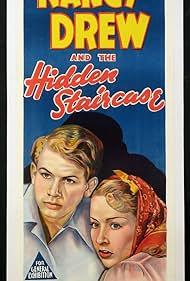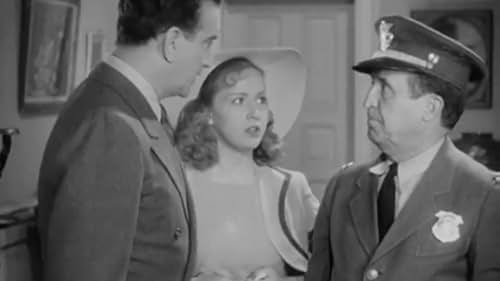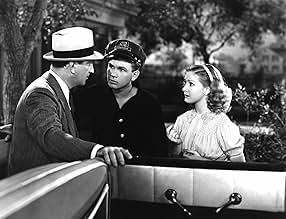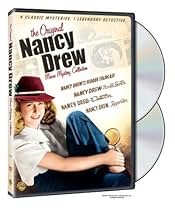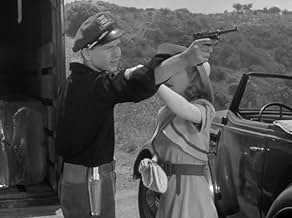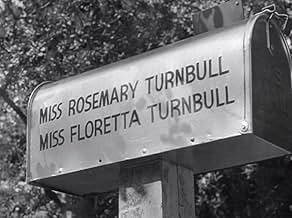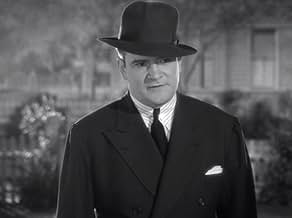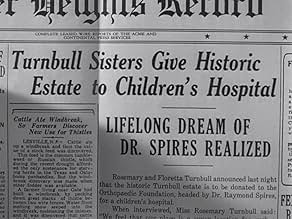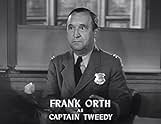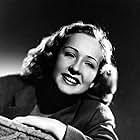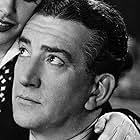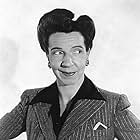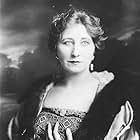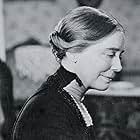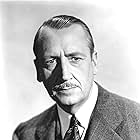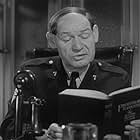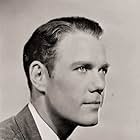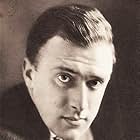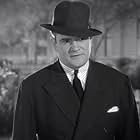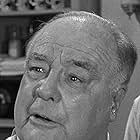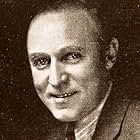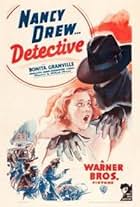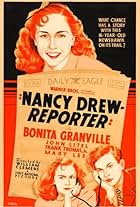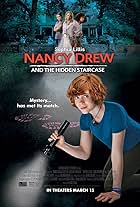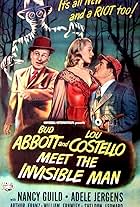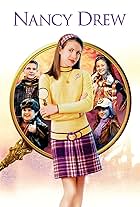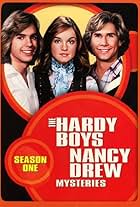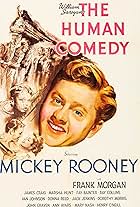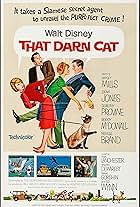Nancy helps two aging spinsters fulfill the byzantine provisions of their father's will, but the murder of their chauffeur complicates matters.Nancy helps two aging spinsters fulfill the byzantine provisions of their father's will, but the murder of their chauffeur complicates matters.Nancy helps two aging spinsters fulfill the byzantine provisions of their father's will, but the murder of their chauffeur complicates matters.
- Director
- Writers
- Stars
William Hopper
- Reporter
- (as DeWolf Hopper)
Frederic Tozere
- District Attorney's Investigator
- (as Fredric Tozere)
Fern Barry
- McKeever's Secretary
- (uncredited)
- Director
- Writers
- All cast & crew
- Production, box office & more at IMDbPro
Featured reviews
Bonita Granville has the title role in "Nancy Drew and the Hidden Staircase," the final entry into the Nancy Drew series. It also stars Frankie Thomas and John Litel. This particular film is based on one of the actual books, but how closely it sticks to the story - well, I haven't read Nancy Drew in nearly 50 years, so I can't remember. Since in the books, Nancy had two girlfriends, missing in the series, it probably doesn't stick all that closely.
In this one, Nancy is determined to make sure that two elderly sisters keep to their father's will so that the house can be donated to a hospital. That won't happen unless at least one of them is in the house every night for twenty years. With only two weeks to go, and their chauffeur shot dead in the house, the ladies want out - fast.
Nancy manages to drag Ted Nickerson, her quasi-boyfriend, into all kinds of trouble, and that's where the fun happens. Thomas is a riot. Nancy always got into deep water in the books, but I remember her as more serious and perfect. That wouldn't have worked for the films, so Nancy is kind of a Lucy and Ted is Ethel, an unwilling participant in her schemes.
Bonita Granville was a fine movie Nancy, very lively, wacky, and likable. It's a shame there are only four "Nancy Drew" films. It is a very good series.
In this one, Nancy is determined to make sure that two elderly sisters keep to their father's will so that the house can be donated to a hospital. That won't happen unless at least one of them is in the house every night for twenty years. With only two weeks to go, and their chauffeur shot dead in the house, the ladies want out - fast.
Nancy manages to drag Ted Nickerson, her quasi-boyfriend, into all kinds of trouble, and that's where the fun happens. Thomas is a riot. Nancy always got into deep water in the books, but I remember her as more serious and perfect. That wouldn't have worked for the films, so Nancy is kind of a Lucy and Ted is Ethel, an unwilling participant in her schemes.
Bonita Granville was a fine movie Nancy, very lively, wacky, and likable. It's a shame there are only four "Nancy Drew" films. It is a very good series.
This is the fourth of four Nancy Drew films by Warner Brothers starring Bonita Granville. It was based on the Drew story "The Hidden Staircase", though I've never read the book and have no idea how close it is to the original tale. But, knowing Hollywood, many liberties were taken with the story.
The story begins by learning that two elderly sisters, the Turnbulls, stand to inherit the home they've been living in many years. However, the will has an odd proviso--that they MUST remain in it every night until some goal is met. Well, they've abided by the will so far, but when their servant is murdered and all sorts of mayhem follows, the sisters' resolve begins to wane. Naturally, the pushy Nancy Drew has decided to make the case her business and naturally the cops investigating are all idiots!
This film is one of about 600,000 B-mysteries made by Hollywood...and they were churned out like mad by both the big studios and the tiny ones. Why? Well, they were pretty cheap to make and made plenty of money! And, compared to the rest of them, this one is a bit better due mostly to better and more competent direction. Too many of them simply looked rushed but this one seemed more polished and complete. Well worth seeing.
The story begins by learning that two elderly sisters, the Turnbulls, stand to inherit the home they've been living in many years. However, the will has an odd proviso--that they MUST remain in it every night until some goal is met. Well, they've abided by the will so far, but when their servant is murdered and all sorts of mayhem follows, the sisters' resolve begins to wane. Naturally, the pushy Nancy Drew has decided to make the case her business and naturally the cops investigating are all idiots!
This film is one of about 600,000 B-mysteries made by Hollywood...and they were churned out like mad by both the big studios and the tiny ones. Why? Well, they were pretty cheap to make and made plenty of money! And, compared to the rest of them, this one is a bit better due mostly to better and more competent direction. Too many of them simply looked rushed but this one seemed more polished and complete. Well worth seeing.
Wills like this one are usually only found in mystery novels. Two spinster sisters were left property by their father on the condition that at least one of them remain there every night for twenty years at which time they can sell out. Otherwise it reverts to the city. That certainly must have cramped their social life, no wonder they remained spinsters.
But when the family chauffeur is murdered and other strange things happen our teenage heroine goes to work. As usual Bonita is helped by Frankie who it seems she can talk into just about anything in these films including having all American football player Thomas lose his clothes and have to get into drag which was an offense back in the day.
In three of the four films law enforcement is represented by Frank Orth as the local police captain. Seeing Orth in what was his career role as the bumbling Captain Tweedy, no wonder they need Granville's help whenever a serious crime occurs.
There would be no more Nancy Drew films after this as Granville left Warner Brothers. It was a nice series and I'm sure the kids in the Saturday matinée crowd enjoyed it. Dashiell Hammett and Raymond Chandler were not threatened by Carolyn Keene though.
But when the family chauffeur is murdered and other strange things happen our teenage heroine goes to work. As usual Bonita is helped by Frankie who it seems she can talk into just about anything in these films including having all American football player Thomas lose his clothes and have to get into drag which was an offense back in the day.
In three of the four films law enforcement is represented by Frank Orth as the local police captain. Seeing Orth in what was his career role as the bumbling Captain Tweedy, no wonder they need Granville's help whenever a serious crime occurs.
There would be no more Nancy Drew films after this as Granville left Warner Brothers. It was a nice series and I'm sure the kids in the Saturday matinée crowd enjoyed it. Dashiell Hammett and Raymond Chandler were not threatened by Carolyn Keene though.
Warner Bros. filmed several of these Nancy Drew stories in the late 1930s with Bonita Granville, Frankie Thomas and John Litel top-billed and this one is probably the best--and the only one actually based on one of the early Carolyn Keene novels.
But the script is a hapless, far-fetched one and really stretches credibility and patience when viewed today. Only a certain nostalgia for these kind of B-films that played the lower half of a double bill can have any appeal for modern viewers.
The actors aren't to blame. Bonita Granville as Nancy does an excellent job, as does Frankie Thomas as her All-American boyfriend Ted, and John Litel as her lawyer father. All of it, however, is weakened by a poor script and a weak storyline. Only the last twenty minutes or so maintains any real suspense.
Most of it is pretty uninvolving but appeals more as a curiosity piece than anything else.
But the script is a hapless, far-fetched one and really stretches credibility and patience when viewed today. Only a certain nostalgia for these kind of B-films that played the lower half of a double bill can have any appeal for modern viewers.
The actors aren't to blame. Bonita Granville as Nancy does an excellent job, as does Frankie Thomas as her All-American boyfriend Ted, and John Litel as her lawyer father. All of it, however, is weakened by a poor script and a weak storyline. Only the last twenty minutes or so maintains any real suspense.
Most of it is pretty uninvolving but appeals more as a curiosity piece than anything else.
Long before Harry Potter arrived to slake the thirst of voracious young readers, the factory minted Hardy Boys and Nancy Drew mystery series were getting regular readers.
While straight forward and relatively uncomplicated in their mystery plotting, they were basically solid "B" level templates, and at the height of the 30's Hollywood mystery vogue, Warner Brothers jumped on the bandwagon with a creditable four film series of Nancy Drew's - this final effort arguably the best (and the only one to share a title and a couple plot elements with an actual Nancy Drew book).
Bonita Granville makes a borderline silly Nancy, with a mad energy level approaching Betty Hutton levels and (plot-wise) causing as many problems as she solves, but once accepted, her chemistry with John Litel's warm Carson Drew (the father figure) and Frankie Thomas' guileless comic foil/boyfriend Ted Nickerson is outstanding. Had the series tried for more, these solid supporting performances might well have kept it around for a longer run, but Granville's frequently charming caricature and Frank Orth's even sillier Police Captain Tweedy (who never listens to ANYONE once he hears half a clue) firmly place it in limited audience "B" territory - above the cartoonish "Dick Tracy" series, but several steps below the longer running "adult" Charlie Chan's, Mr. Moto's, Sherlock Holmes', Thin Man's or even the solid Saint's, Falcon's or Lone Wolf's.
The best thing about the series 70 years after it was first shown (and which should still hold the attention of the serious film lover) is its beautifully observed picture of life in small town America just before World War II, when icemen actually did deliver blocks of ice to the actual ice boxes which adorned most kitchens (and the standard system for calling for delivery) both of which form interesting plot points.
We're not talking great art here. Consider the drop in quality of the still decent 3rd and 4th Harry Potter films - as the books got better, "movie-movie" directors made the films less faithful and less effective. At least the Nancy Drew series ended on a high note as they edged closer to the source material.
While straight forward and relatively uncomplicated in their mystery plotting, they were basically solid "B" level templates, and at the height of the 30's Hollywood mystery vogue, Warner Brothers jumped on the bandwagon with a creditable four film series of Nancy Drew's - this final effort arguably the best (and the only one to share a title and a couple plot elements with an actual Nancy Drew book).
Bonita Granville makes a borderline silly Nancy, with a mad energy level approaching Betty Hutton levels and (plot-wise) causing as many problems as she solves, but once accepted, her chemistry with John Litel's warm Carson Drew (the father figure) and Frankie Thomas' guileless comic foil/boyfriend Ted Nickerson is outstanding. Had the series tried for more, these solid supporting performances might well have kept it around for a longer run, but Granville's frequently charming caricature and Frank Orth's even sillier Police Captain Tweedy (who never listens to ANYONE once he hears half a clue) firmly place it in limited audience "B" territory - above the cartoonish "Dick Tracy" series, but several steps below the longer running "adult" Charlie Chan's, Mr. Moto's, Sherlock Holmes', Thin Man's or even the solid Saint's, Falcon's or Lone Wolf's.
The best thing about the series 70 years after it was first shown (and which should still hold the attention of the serious film lover) is its beautifully observed picture of life in small town America just before World War II, when icemen actually did deliver blocks of ice to the actual ice boxes which adorned most kitchens (and the standard system for calling for delivery) both of which form interesting plot points.
We're not talking great art here. Consider the drop in quality of the still decent 3rd and 4th Harry Potter films - as the books got better, "movie-movie" directors made the films less faithful and less effective. At least the Nancy Drew series ended on a high note as they edged closer to the source material.
Did you know
- TriviaFourth and last film in the "Nancy Drew" series released by Warner Bros. from 1938 to 1939. Three years later, the series' star, Bonita Granville, would return to Warners briefly for a supporting role in the Bette Davis classic, Now, Voyager (1942).
- GoofsAs Ted and Nancy talk outside the Turnbull house following the scene in which the Turnbull sisters report the theft of minor household items, the shadow of the boom mic can be seen passing across a wooden post behind them.
- Quotes
Ted Nickerson: [trying to impress the maid with a joke] A duck is a chicken with snowshoes.
Nancy Drew: And a halfwit is a person who spends half their time trying to be witty.
- ConnectionsFollows Nancy Drew: Detective (1938)
- How long is Nancy Drew and the Hidden Staircase?Powered by Alexa
Details
- Runtime1 hour
- Color
- Sound mix
- Aspect ratio
- 1.37 : 1
Contribute to this page
Suggest an edit or add missing content

Top Gap
By what name was Nancy Drew and the Hidden Staircase (1939) officially released in Canada in English?
Answer